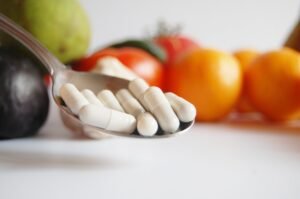Reduces the onset risk and honeymoon phase of Type 1 Diabetes
**This is the first part of a two-part series on vitamin D and sunlight. Please find the second blog post of the series here.**

Summary: Vitamin D is crucial beyond bone health, impacting Type 1 Diabetes (T1D) by reducing its onset risk and potentially extending the insulin-free “honeymoon” phase post-diagnosis. Despite widespread deficiency among T1D patients, dietary sources like fish and fortified foods are inadequate, prompting exploration of supplements. However, natural sunlight, which boosts serotonin, aids sleep, and reduces inflammation without risk of toxicity, emerges as an optimal source for holistic healing.
The Importance Of Vitamin D In Type 1 Diabetes
Vitamin D is essential for strong bones because the body requires Vitamin D to metabolise calcium for bone health. However, the importance of Vitamin D extends well beyond this one factor for those currently with the condition of Type 1 Diabetes.
The link between Type 1 Diabetes and Vitamin D is very interesting. For example, it has been clearly demonstrated in the scientific literature that adequate Vitamin D supplementation reduces the risk of later developing Type 1 Diabetes. This therefore makes me wonder if it’s therefore also a necessary factor in reversing T1D…?
Preliminary research findings also suggest that Vitamin D supplementation in the initial period following diagnosis may also successfully extend the honeymoon period in Type 1 Diabetes, meaning insulin will either be not required or will be required at much lower doses for a longer period of time.
I also found another interesting study that demonstrated how Vitamin D deficiency contributes to the development of Type 2 Diabetes. The author discusses how low levels of Vitamin D lead to increased insulin resistance, which in turn leads to beta-cell burnout. In healing my T1D, I believe that minimising my insulin resistance is likely to give my healing pancreas more of a chance to produce adequate insulin for my body’s needs if I am asking it to produce less.
Furthermore, Vitamin D deficiency has also been shown to inhibit insulin production in the pancreas. This is exactly what I don’t want to be doing if I want to heal so vitamin D sufficiency is a must!!
What I find particularly heartbreaking is that, despite the benefits to T1D and healing, the majority of people going through the condition of Type 1 Diabetes have Vitamin D deficiency. It is very common, with a prevalence ranging from 15% to 90.6% in clinical samples. Since Vitamin D treatment has been shown to improve both blood sugar control and insulin sensitivity, this deficiency is hugely detrimental to the T1D population.
Sources Of Vitamin D: Food, Supplements And Sunlight
Okay, I am definitely persuaded that Vitamin D is vital to my healing journey due to the raft of health benefits it provides. So how do I get enough of this little beauty??
Vitamin D In Food… Fish, Mushrooms And Fortified Foodstuffs
 Very few natural foods contain a good amount of vitamin D. Those that do include several types of fish (salmon, herring, sardines and tuna) and mushrooms. Other food sources that provide vitamin D are fortified foods, where vitamin D has been artificially added. These include cow’s milk, cereal, orange juice and soy milk. but the chance of being able to fully consume the required daily allowance of Vitamin D purely through what you eat is pretty low. We just don’t eat enough of these kinds of foods. So whilst I do now eat a good amount of fish (see my blog post here on that topic), I feel I need to look beyond food for additional sources of vitamin D.
Very few natural foods contain a good amount of vitamin D. Those that do include several types of fish (salmon, herring, sardines and tuna) and mushrooms. Other food sources that provide vitamin D are fortified foods, where vitamin D has been artificially added. These include cow’s milk, cereal, orange juice and soy milk. but the chance of being able to fully consume the required daily allowance of Vitamin D purely through what you eat is pretty low. We just don’t eat enough of these kinds of foods. So whilst I do now eat a good amount of fish (see my blog post here on that topic), I feel I need to look beyond food for additional sources of vitamin D.
Vitamin D Supplements
 The next obvious place to look for additional sources of Vitamin D are through supplements. They are easy to use and provide a guaranteed level of Vitamin D each day. Easy! Or is it?
The next obvious place to look for additional sources of Vitamin D are through supplements. They are easy to use and provide a guaranteed level of Vitamin D each day. Easy! Or is it?
The thing is…. I spent most of my early thirties being Vitamin D deficient. I took supplement after supplement – some prescribed by doctors, some purchased privately from ‘top of the range’ supplement providers, some just from pharmacies. I took them all diligently but none – NONE! – of them got my Vitamin D back in range. During this time, I became aware that Vitamin D is a fat soluble vitamin, needing the presence of fat to be properly absorbed. So then I took my supplement with my meals. Yet I still remained Vitamin D deficient!!
This changed for me after my daughter was born. When she was six months old, I attended a talk at my local nursery on weaning. The nurse practitioner running the class was wearing a badge that read ‘Ask me about Vitamin D’. So I did. She said that, because we were so good these days at protecting our children with sunscreen, the rate of rickets is rising in children. So she wanted to advise us all to give our children supplements to counteract this. At this point my intuition started screaming at me… This seemed absolutely mad…! We are supposed to use a manufactured product (sunscreen) to protect our children but then need to use another manufactured product (vitamin D supplements) to counter the side effect?!?! And, from my own experiences, I knew that this Vitamin D wouldn’t even necessarily be an effective solution… It wasn’t for me!! The simple solution I landed up was simply letting my child play in the sun, in the same way generations before her have also done!
Vitamin D From Sunlight
Benefits Of Sunlight
However, the benefits on health of sunlight go way beyond avoiding vitamin D deficiency. I include herewith a whole host of other factors that support the inclusion of safe sun exposure as part of daily life…
Avoidance Of Vitamin D Toxicity
An additional benefit of using sunlight as my source of Vitamin D is that it avoids the potential for vitamin D toxicity. Although rare, it is indeed possible to develop vitamin D toxicity from over-supplementation. This can cause nausea, vomiting, weakness and frequent urination. Unlike other sources of vitamin D, sun exposure does not typically lead to vitamin D toxicity due to the body’s ability to naturally regulate production.
Increased Levels Of Serotonin – The Wellbeing And Happiness Hormone
I know that when I have spent time in sunlight, I feel better… Whether that’s lazing in the grass with a book or even just sitting in a graveyard for an hour whilst I had lunch (yeah, I know it’s weird but it was the only outside space near where I used to work…!!). Sunshine just seems to make me feel better and give me more joy. It feels good on my skin.
The scientific literature appears to provide an explanation for my increased joy… It would appear that sitting outside in the sunshine kickstarts your brain’s serotonin production. Serotonin is one of a series of hormones in the body. It acts as a mood stabiliser, providing feelings of wellbeing and happiness. It also promotes a healthy sleep cycle and aids digestion.
Serotonin production fluctuates with the seasons, with higher concentrations being produced in the body in late summer and autumn than in winter and spring in the Western world. The reason for these fluctuations are not completely understood but one strong hypothesis suggests that the skin is responsible for the majority of serotonin production and therefore, as the skin is exposed to less sunshine in the colder months, less serotonin is produced in the body.
So… The more sunlight I can get, the more joyful I will generally feel! I outlined in my post on Dr Kelly Turner’s research that increasing positive emotions has been identified as one of the nine key healing factors so that makes sunlight exposure even more vital to healing.
Better Sleep
Sun exposure on the skin produces the chemical melanin, which is needed to produce the hormone melatonin. Melatonin is necessary to maintain the daily circadian rhythms of the body, rhythms that are essential for regulating sleep.
Reduced Weight
Better Mental Health
Vitamin D supplementation has been found to reduce anxiety and improve mood in female diabetic patients. However, Vitamin D has not been found to impact depression.
Improved Cell Proliferation and Differentiation
Vitamin D has also been found to play a key role in the process of cell proliferation and differentiation in the human body. As I intend to encourage more beta cell proliferation and also conversion (differentiation!) of my delta cells to beta cells, Vitamin D is crucial to my healing journey!
Reduced Inflammation
Vitamin D deficiency has been linked to an increase in body-wide inflammation. I believe that inflammation increases insulin resistance and decreases healing. It is something I continually strive to minimise in my body.
Summary
In this blog post, I have discussed how important vitamin D is for health and healing in Type 1 Diabetes. For Type 1 Diabetes specifically, I highlighted how vitamin D has been shown to improve blood sugar control, reduce insulin resistance, prevent development of Type 1 Diabetes. I continued by outlining three sources of vitamin D – food, supplements and sunshine. I discussed why I felt sunlight was the preferable source for vitamin D production and the many benefits additional to vitamin D production that sunlight provides. In my next blog post, I will talk more about ensuring adequate sun exposure in a safe manner and how I am incorporating this into my life.

GET HEALINGT1D’S FUTURE ARTICLES IN YOUR INBOX!
Get the latest musings and findings straight to your email inbox.

Natalie is a blogger with Type 1 Diabetes. Natalie's special gifts are questioning the status quo and being a rebel. She is using these gifts to question medical 'knowledge' and find a true cure for Type 1 Diabetes.
Recent Comments:
- Sandra on Nutrition Update
- latestModapks on Daniel Darkes
- Natalie Leader on Daniel Darkes
- Senna on Daniel Darkes
- Sandra on High Blood Pressure




